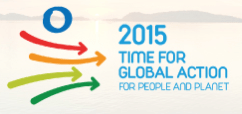 20 July 2015: A group of civil society organizations held a side event to exchange views on the 8 July version of the post-2015 development agenda. World Vision, Beyond2015, International Disability Alliance, World Vision, Save Children, International Women’s Health Coalition, and SOS Children’s Villages International co-sponsored the side event, which took place on 20 July 2015, at UN Headquarters in New York, US, on the sidelines of the seventh session in the intergovernmental negotiation process to draft the outcome document of the post-2015 summit.
20 July 2015: A group of civil society organizations held a side event to exchange views on the 8 July version of the post-2015 development agenda. World Vision, Beyond2015, International Disability Alliance, World Vision, Save Children, International Women’s Health Coalition, and SOS Children’s Villages International co-sponsored the side event, which took place on 20 July 2015, at UN Headquarters in New York, US, on the sidelines of the seventh session in the intergovernmental negotiation process to draft the outcome document of the post-2015 summit.
The first panel speaker, Naiara Costa, Beyond 2015, stressed investing in children and in ensuring food security as key issues to be prioritized in the outcome document. Noting that Beyond2015 and civil society could “see themselves in the outcome document,” she particularly welcomed the focus on universality and inclusion of “people” in the five “Ps” in the preamble. She emphasized the need to make sure that people are reflected “as agents of development and not only as recipients of aid.” Costa also: highlighted the importance of the reference to data, which will be generated in the follow-up and review process; suggested that the text’s references to global partnership seem to refer more to governments and the private sector than to civil society, and should be rebalanced; called for UN Member States to take on the responsibility of communicating the agenda; and cited the need for timelines for national reviews.
Vladimir Cuk, Executive Director of the International Disability Alliance, also welcomed the “people centered” focus of the draft outcome document, but said it needs to better accommodate people with disabilities, including by mentioning “accessibility” in the preamble.
Nicole Cardinal, Save the Children, welcomed the technical revisions to the goals and targets, supported the references to leaving no one behind, and called for adding “participation” as a sixth “P” in the preamble. She emphasized that peace belongs in the agenda, and stressed as two other priorities health and education. She said health is more thanlife expectancy, and targets on education must address not only access, but also the working environment and outcomes of the education provided. She also stressed the importance of keeping momentum in the first year of the SDGs and for setting annual interim targets for the progress of disadvantaged peoples situations.
Sarah Gold, International Women’s Health Coalition, brought attention to The Red Flags Document on women’s empowerment. She said the draft outcome document needs stronger language on sexual and economic rights of women and girls, and to recognize “a human rights-based approach as central to the success of the agenda.” She rejected the language in the new draft on “the family” and suggested using “all families” to recognize diversity.
In the Q&A session, participants expressed additional concerns regarding weakness of the follow-up and review section, and insufficient language on reforms of the global economic governance. [IISD RS Sources] [IISD RS Coverage of Seventh Session] [8 July Version of Draft Outcome Document]